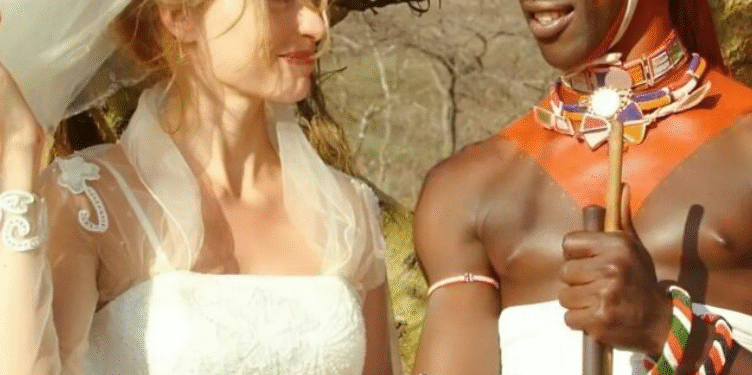In 1987, a young Swiss woman named Corinna Hofmann went with her fiancé Marco to the distant and exotic Kenya – on a safari they had long dreamed of. And then she never saw him again.
Tall, proudly moving and with skin the color of red clay, he stood by the fire of the Samburu tribe, close relatives of the Masai.
His name was Lketinga Leparmoriyo. One look was enough to fall in love. The girl left her boyfriend for an African.
However, a relationship with a man from a tribe living by centuries-old traditions turned out to be not as romantic as she had imagined.
The girl married an African from a different country and gave birth to a child from the way their children looked
Lketinga was unyielding and direct. He responded to her complaints – whether about the heat, flies or strange habits – with restraint, almost indifference:
“If you don’t like it, go back to your Marco.”
But Corinna was stubborn. She sold her business in Switzerland, abandoned her old life and moved to a Kenyan village where she opened a grocery store.
In time, she became a citizen and became one of the Samburu – as much as she could.
A new life began. A straw hut called a manyatta, a kerosene lamp, cold water, hand washing, no standard amenities, no medicine, not even toilet paper. But she accepted that.
The girl married an African man from a different country and gave birth to a child from what their children looked like
When their daughter, Napirai, was born, everything changed. It was as if Lketinga had been possessed by a demon. He suspected that the child was not his.
He began to feel jealous, especially towards the men who came to the shop.
Two years later, in 1990, she could no longer bear it. Taking her daughter, she fled to Europe – to peace and order, far from cruelty and distrust.
Devushka married an African from a different country and gave birth to a child from the way their children looked
Fifteen years passed. In 2005, Corinna returned to Kenya, working on a film based on her book. She met up with old Lketinga.
